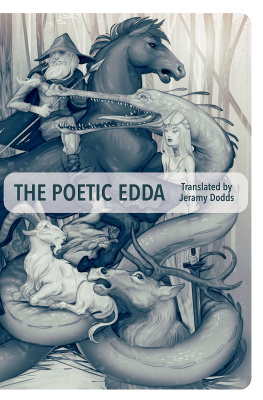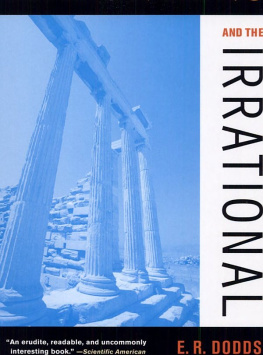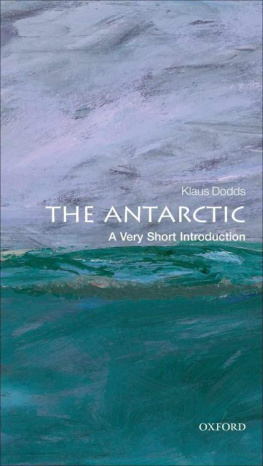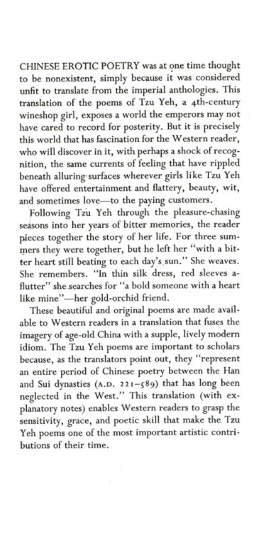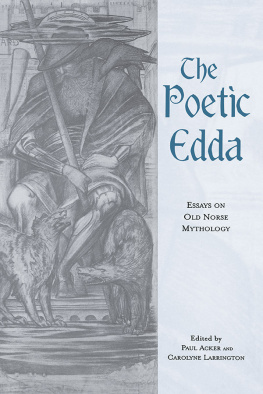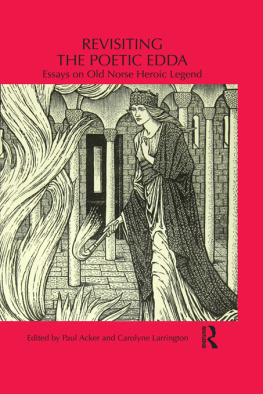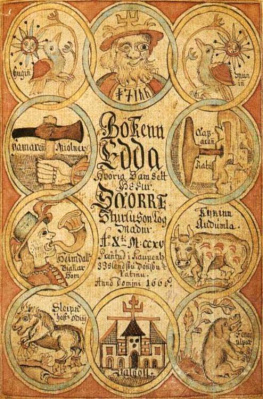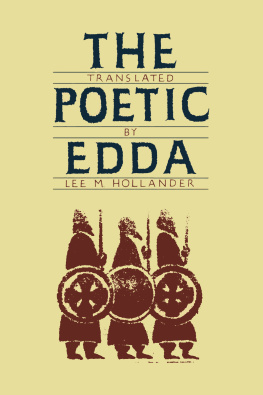Dodds - The Poetic Edda
Here you can read online Dodds - The Poetic Edda full text of the book (entire story) in english for free. Download pdf and epub, get meaning, cover and reviews about this ebook. City: Toronto;Ontario, year: 2015;2014, publisher: Coach House Press, genre: Detective and thriller. Description of the work, (preface) as well as reviews are available. Best literature library LitArk.com created for fans of good reading and offers a wide selection of genres:
Romance novel
Science fiction
Adventure
Detective
Science
History
Home and family
Prose
Art
Politics
Computer
Non-fiction
Religion
Business
Children
Humor
Choose a favorite category and find really read worthwhile books. Enjoy immersion in the world of imagination, feel the emotions of the characters or learn something new for yourself, make an fascinating discovery.
- Book:The Poetic Edda
- Author:
- Publisher:Coach House Press
- Genre:
- Year:2015;2014
- City:Toronto;Ontario
- Rating:4 / 5
- Favourites:Add to favourites
- Your mark:
- 80
- 1
- 2
- 3
- 4
- 5
The Poetic Edda: summary, description and annotation
We offer to read an annotation, description, summary or preface (depends on what the author of the book "The Poetic Edda" wrote himself). If you haven't found the necessary information about the book — write in the comments, we will try to find it.
Dodds: author's other books
Who wrote The Poetic Edda? Find out the surname, the name of the author of the book and a list of all author's works by series.
The Poetic Edda — read online for free the complete book (whole text) full work
Below is the text of the book, divided by pages. System saving the place of the last page read, allows you to conveniently read the book "The Poetic Edda" online for free, without having to search again every time where you left off. Put a bookmark, and you can go to the page where you finished reading at any time.
Font size:
Interval:
Bookmark:


Dodds, Jeramy, 1974-, translator II. Title. PT7234.E5D63 2014 839.61 C2014-904399-6 Issued in print and electronic formats. ISBN 978 1 77056 385 8 (epub) The Poetic Edda is also available as a print book: ISBN 978 1 77056 385 8 etta er fyrir strbrotna foreldra mna sem settu mig
herar gosagnar og gfu mr taumana. CONTENTS FOREWORD by Terry Gunnell, University of Iceland The Eddic poems, invaluable primary sources on early Nordic mythology and heroic legend, are preserved in two main manuscripts written by Christian scribes in Iceland in the late thirteenth/early fourteenth century, although most of them appear to have much earlier roots. The general consensus is that, prior to this time, the poems were passed on within the oral tradition for at least two hundred years, and that they have a background in a society that knew little about Christianity.
Considering the comparatively positive attitudes expressed about the pagan gods in the poems, the gods named, the archaeological objects mentioned and the environment described, it would also seem that many of the poems have a background in mainland Scandinavia. It is possible that some of them (in an earlier form) were associated with pagan ritual. There is little question that they contain some of the earliest source material on pagan Old Norse mythology outside runic inscriptions and the iconography displayed on archaeological remains. The fact that these were poems that lived in the oral tradition of Iceland (and possibly that of mainland Scandinavia before that) underlines that whatever an Eddic poem has come to be today, it is not what it was: in other words, it was an entity that existed in the form of sound rather than symbols written on pergament, which would have been received by the ears and eyes of a living audience in a performance space that would often have taken the form of a smoky, shadowy, pillared hall or long house with beds or benches on either side, and lit by a long fire running down the middle of the building. The words in question would have been spoken by a skilled performer (or group of performers) who would have probably been known by their audience. Most of these performers would have learned the poem from others, and then adapted it to suit the performance surroundings.
As texts learned, performed and passed on to others in the form of sound, the received poems would have been defined by their living context (environment, audience and social circumstances), each performance being totally individual (like any slam performance in our own time). There can be little question that these works would have been viewed by the poet, the later performers and the audience as something closer to music than literature and for some, sacred music. The means and nature of the performance of these works will also have varied. The Eddic poems seem to belong to more than one genre, the works having been gathered together in one manuscript to make up a thematic collection of poems relating to Nordic gods and heroes. The collection is usually often referred to as the Poetic Edda as a means of distinguishing it from the so-called Prose Edda , composed by the Icelandic chieftain, scholar and poet Snorri Sturluson for other budding Icelandic poets in the early thirteenth century, containing details of mythology and rules of poetics. The poems assigned to the Poetic Edda take at least two forms, distinguished by metre and performance demands.
The most common are those poems composed in so-called fornyrislag (old-lore) metre, which is closely related to that used for Old English poems like Beowulf . Poems in this metre are most commonly broken up into strophes of eight alliterating lines, with two strong beats per line, which tell a story in the third person. While the poem might involve some dialogue, characters are usually clearly introduced as part of the poetic text. The performance would thus have involved a single poet telling an audience in the present about events that took place in the past or the mythological world of the gods. The second most common type of Eddic poetry would have been quite different. This was composed in ljahttr (the metre of charms/spells), which was closely related to the slightly longer galdralag (the rhythm of magic).
This metre involves shorter six-line strophes, usually made up of two strophe-halves of two lines with two beats followed by a third containing three beats. The other key distinguishing feature of ljahttr is that it is used only for poems taking the form of direct speech, works that take the form of dialogues or monologues, and for which both manuscripts consistently use additional initials placed in the outer margins to indicate the identity of speakers (for example, . q. standing for rr qva [Thor said]). In performance, indoors or outdoors, these poems would have worked very much like drama, with the performer(s) taking on roles. the Hall of the Chosen). the Hall of the Chosen).
It is noteworthy that this type of poem also largely keeps to dramatic unities of time, place and action, and predominantly deals with mythology rather than heroes. There is good reason to assume that it has a background in a pre-Christian environment and has possible connections to early ritual. Considering what has been said above about the essential nature of Eddic poetry, it is clear that the versions of the poems in the earliest manuscripts are all translations of a kind. As the late John Miles Foley and other scholars of oral tradition have regularly pointed out, the transposition of an oral poem to pergament or paper means a translation from one form of transmission to another that is wholly different. Gone are the tones, rhythms, changes in speed and volume, gestures, eye contact, surroundings and other visual effects, and the immediacy that would have accompanied the original works as they changed and developed over time, permanently under construction. In place comes a static form of literary sheet music, in which the once-living poem has started to resemble a butterfly pinned to a board for examination.
Meaning is generated through the interplay of the words of the poet-performer and the understanding of his/her audience; the original performer would have expected to play off the knowledge and expectations of the audience, much like a slam poet or stand-up comic will do today. Naturally, audiences and their knowledge change over time, meaning that the words of the poems will mean less (or something new) to those who read (or hear) them in later centuries. Nonetheless, the way the original work was received is always going to be as lost to us, just as modern audiences of Shakespeare can never experience the earliest plays of the Bard as the London audiences of 1600 would have. Modern Icelandic readers of the Poetic Edda understand the words but still feel the poems come from a place that is essentially foreign to them. The translation of poetic texts like the Poetic Edda into a foreign language is thus always going to be a matter of translating not only words and music, but also meaning, sense, feeling and context. Arguably, it is impossible to translate any poem perfectly.
Font size:
Interval:
Bookmark:
Similar books «The Poetic Edda»
Look at similar books to The Poetic Edda. We have selected literature similar in name and meaning in the hope of providing readers with more options to find new, interesting, not yet read works.
Discussion, reviews of the book The Poetic Edda and just readers' own opinions. Leave your comments, write what you think about the work, its meaning or the main characters. Specify what exactly you liked and what you didn't like, and why you think so.

